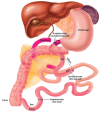IMMUNOLOGICAL EVALUATION OF PATIENTS WITH TYPE 2 DIABETES MELLITUS SUBMITTED TO METABOLIC SURGERY
- PMID: 26734798
- PMCID: PMC4755180
- DOI: 10.1590/S0102-6720201500040012
IMMUNOLOGICAL EVALUATION OF PATIENTS WITH TYPE 2 DIABETES MELLITUS SUBMITTED TO METABOLIC SURGERY
Erratum in
-
Erratum.Arq Bras Cir Dig. 2017 Apr-Jun;30(2):164. doi: 10.1590/0102-6720201700020020. Arq Bras Cir Dig. 2017. PMID: 29257858 Free PMC article.
Abstract
Background: Immunological and inflammatory mechanisms play a key role in the development and progression of type 2 diabetes mellitus.
Aim: To raise the hypothesis that alterations in immunological parameters occur after duodenojejunal bypass surgery combined with ileal interposition without gastrectomy, and influences the insulin metabolism of betacells.
Methods: Seventeen patients with type 2 diabetes mellitus under clinical management were submitted to surgery and blood samples were collected before and six months after surgery for evaluation of the serum profile of proinflammatory (IFN-γ, TNF-α, IL-17A) and anti-inflammatory cytokines (IL-4, IL-10). In addition, anthropometric measures, glucose levels and insulin use were evaluated in each patient.
Results: No changes in the expression pattern of proinflammatory cytokines were observed before and after surgery. In contrast, there was a significant decrease in IL-10 expression, which coincided with a reduction in the daily insulin dose, glycemic index, and BMI of the patients. Early presentation of food to the ileum may have induced the production of incretins such as GLP-1 and PYY which, together with glycemic control, contributed to weight loss, diabetes remission and the consequent good surgical prognosis of these patients. In addition, the control of metabolic syndrome was responsible for the reduction of IL-10 expression in these patients.
Conclusion: These findings suggest the presence of low-grade inflammation in these patients during the postoperative period, certainly as a result of adequate glycemic control and absence of obesity, contributing to a good outcome of surgery.
Mecanismos imunológicos e inflamatórios desempenham papel-chave no desenvolvimento e progressão do diabete melito tipo 2.
Levantar a hipótese de que alterações nos parâmetros imunológicos ocorrem após operação duodenojejunal combinada com interposição ileal sem gastrectomia, e influenciam o metabolismo da insulina das células beta.
Dezessete pacientes com diabete melito tipo 2 sob manejo clínico foram submetidos à cirurgia e amostras de sangue foram coletadas antes e seis meses após para avaliação do perfil de sorológico de citocinas pró-inflamatórias (IFN-γ, TNF-α, IL-17A) e anti-inflamatórias(IL-4, IL-10). Além disso, parâmetros antropométricos, glicemia e uso de insulina foram avaliados em cada paciente.
Não ocorreram alterações no padrão de expressão de citocinas pró-inflamatórias observadas antes e depois da operação. Em contraste, houve diminuição significativa na expressão de IL-10, que coincide com redução da dose diária de insulina, com o controle glicêmico e redução do IMC dos pacientes. Apresentação precoce de alimentos para o íleo pode ter induzido a produção das incretinas tais como GLP-1 e PYY, que, juntamente com o controle da glicemia, contribuíram para a perda de peso, remissão do diabete e o bom prognóstico consequente cirúrgico. Além disso, o controle de síndrome metabólica foi responsável pela redução da expressão de IL-10 nestes doentes.
Baixo grau de inflamação estava presente nesses pacientes no pós-operatório, certamente pelo adequado controle glicêmico e ausência de obesidade, o que contribuiu para bom resultado cirúrgico.
Conflict of interest statement
Conflicts of interest: none
Figures


References
-
- Benfield T, Jensen JS, Nordestgaard BG. Influence of diabetes and hyperglycaemia on infectious disease hospitalisation and outcome. Diabetologia. 2007;50:549–554. - PubMed
-
- Carvalho MHC, Colaço AL, Fortes ZB. Cytokines, Endothelial Dysfunction, and Insulin Resistance. Arq Bras Endocrinol Metab. 2006;50:304–312. - PubMed
-
- Campos JM, Lins DC, Silva LB, Araujo-Junior JG, Zeve JL, Ferraz ÁA. Metabolic surgery, weight regain and diabetes re-emergence. Arq Bras Cir Dig. 2013;26(1):57–62. - PubMed
-
- Choi KM, Ryu OH, Lee KW, Kim HY, Seo JA, Kim SG. Serum adiponectin, interleukin-10 levels and inflammatory markers in the metabolic syndrome. Diabetes Res Clin Pract. 2007;75:235–240. - PubMed
-
- Cieslak M, Wojtczak A, Cieslak M. Role of pro-inflammatory cytokines of pancreatic islets and prospects of elaboration of new methods for the diabetes treatment. Acta Biochim Pol. 2015;62(1):15–21. - PubMed
MeSH terms
LinkOut - more resources
Full Text Sources
Medical

